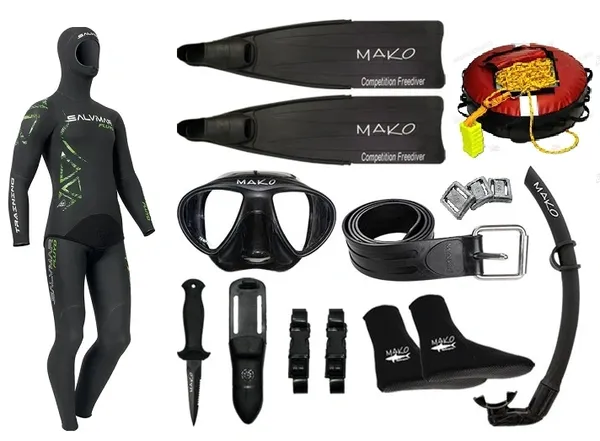Equipping For The Depths

Essential Freediving Gear You Can’t Dive Without
Embarking on a freediving adventure requires not just courage and skill but also the right gear to ensure safety, comfort, and optimal performance. In this post, we’ll explore the essential freediving gear that every enthusiast should consider, from the basics to specialized equipment designed to enhance the underwater experience.
Mask and Snorkel:
- A well-fitted low-volume mask is crucial for providing a clear field of vision and minimizing air space, making equalization easier.
- A comfortable snorkel facilitates efficient breathing at the surface, allowing freedivers to conserve energy between dives.
Fins:
- Long-blade fins provide the necessary propulsion for freedivers to move efficiently through the water.
- Choose fins that match your skill level and the type of diving you plan to do, whether it’s dynamic apnea in a pool or deep dives in the open ocean.
Wetsuit or Freediving Suit:
- A well-fitting wetsuit or freediving suit is essential for maintaining body temperature and protecting against potential stings or cuts from marine life.
- Thickness of the suit should be chosen based on water temperature and personal comfort preferences.
Weight Belt:
- A weight belt helps achieve neutral buoyancy, allowing freedivers to descend and ascend effortlessly.
- Experiment with the amount of weight to find the right balance for your body composition and equipment.
Dive Computer:
- A freediving-specific dive computer provides real-time information on depth, dive time, and surface intervals.
- Advanced models may include features like heart rate monitoring and programmable alarms.
Buoy and Line:
- A buoy attached to a line serves multiple purposes, including marking your position for safety boats and signaling your presence to other watercraft.
- The line also aids in equalization and provides a reference point for orientation during descent and ascent.
Gloves and Socks:
- Depending on water temperature, wearing gloves and socks can add an extra layer of insulation, keeping hands and feet warm during prolonged dives.
- Opt for neoprene materials for flexibility and comfort.
Knife or Line Cutter:
- A compact knife or line cutter is a safety essential, allowing freedivers to quickly and efficiently cut themselves free from entanglements.
Emergency Whistle:
- A small, easily accessible whistle adds an extra layer of safety, enabling divers to signal for assistance in case of emergencies.
Freediving Bag:
- A dedicated bag helps keep all your gear organized and easily transportable.
- Look for features like drainage to prevent the accumulation of water and stow pockets for smaller items.
Conclusion:
Investing in high-quality freediving gear is not just about enhancing performance but, more importantly, ensuring your safety beneath the waves. Each piece of equipment plays a vital role in the freediving experience, providing the tools needed to explore the underwater world with confidence and enjoyment. As you assemble your gear, consider factors such as fit, functionality, and personal preferences to create a setup that caters to your unique freediving journey.


